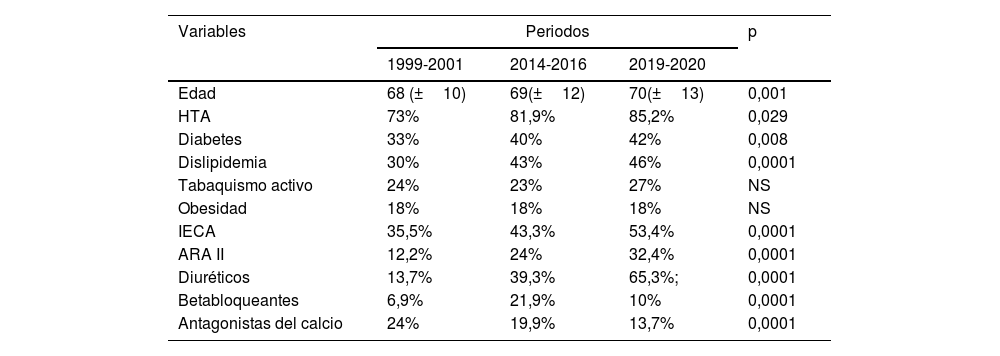La hipertensión arterial (HTA) es un factor de riesgo clave para el ictus. Evaluamos si la importancia de la HTA sobre el riesgo de ictus isquémico ha aumentado en las últimas décadas.
MétodosEstudio retrospectivo de pacientes con ictus isquémico dados de alta en 3 hospitales de Sevilla (España), durante los periodos: 1999-2001, 2014-2016 y 2019-2020.
ResultadosSe incluyeron 1.379 pacientes, 42,6% mujeres, edad media 69,1 (±11) años. La HTA fue el factor de riesgo vascular más prevalente en todos los periodos, con un aumento progresivo de pacientes hipertensos (65,9 vs. 69,6 vs. 74%; p=0,029). La HTA fue especialmente frecuente en pacientes≥80 años (73 vs. 81,9 vs. 85,2%; p=0,029). Al alta se utilizaron progresivamente más fármacos antihipertensivos (en el 65 vs. 85,1 vs. 90,2% de los pacientes; p=0,0001), con un claro aumento en el número de fármacos antihipertensivos utilizados (media 0,9±0,8 vs. 1,5±1 vs. 1,8±0,8 fármacos; p=0,0001). El uso de diuréticos (13,7-39,3-65,3%; p=0,0001), IECA (35,5-43,3-53,4%; p=0,0001) y bloqueadores de los receptores de angiotensina (12,2-24-32,4%; p=0,0001) aumentó progresivamente. Por el contrario, disminuyó el uso de antagonistas del calcio (24-19,9-13,7; p=0,0001).
ConclusionesEn las últimas 2 décadas existe un mayor protagonismo de la HTA entre los pacientes con primer evento cerebrovascular isquémico. Es necesario un mayor y mejor control de la HTA para disminuir la enorme carga de la enfermedad cerebrovascular.
Hypertension (HT) is a key risk factor for stroke. We evaluated whether the importance of hypertension on the risk of ischemic stroke has increased in recent decades.
MethodsRetrospective study of patients with ischemic stroke discharged from 3 hospitals in Seville (Spain), during the periods: 1999-2001, 2014-2016 and 2019-2020.
Results1,379 patients were included, 42.6% women, mean age 69.1 (±11) years. HT was the most prevalent vascular risk factor in all periods, with a progressive increase in hypertensive patients (65.9% vs 69.6% vs 74%; P=.029). HT was especially frequent in patients≥80 years (73% vs 81.9% vs 85.2%; P=.029). At discharge, progressively more antihypertensive drugs were used (in 65% vs 85.1 vs 90.2% of patients; P=.0001), with a clear increase in the number of antihypertensive drugs used (mean 0.9±0.8 vs 1.5±1 vs 1.8±0.8 drugs, P=.0001). The use of diuretics (13.7%-39.3%-65.3%; p=0.0001), ACE inhibitors (35.5%-43.3%-53.4%; P=.0001) and angiotensin receptor blockers (12.2%-24%-32.4%; P=.0001) increased progressively. On the contrary, the use of calcium antagonists decreased (24%-19.9%-13.7%; P=.0001).
ConclusionsIn the last 2 decades there has been a greater role for HT among patients with their first ischemic cerebrovascular event. Greater and better control of HT is necessary to reduce the enormous burden of cerebrovascular disease.








